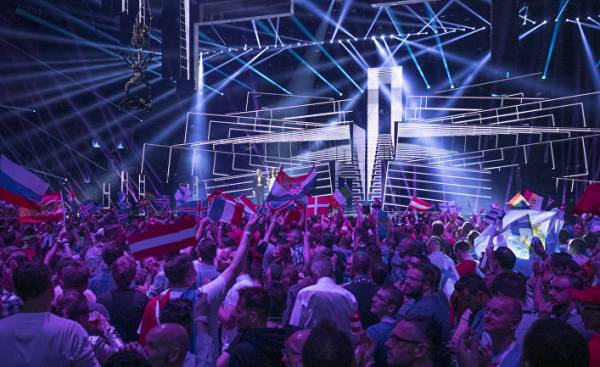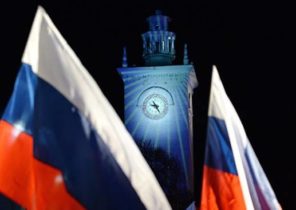
“Politics can be everything! And Eurovision also.”
Iver Neumann (Iver Neumann), Professor of international relations at the London school of Economics and senior researcher at the Norwegian foreign policy Institute (NUPI), rejects all doubts:
“It is only to be seen and to get recognition, and this applies both to individuals and States. And therefore the interest of every store window. International contest of pop song too.”
When Jamala from Ukraine won with her song at Eurovision last year, were powerful emotions and strong facts. But the song is the winner it was not about “love”, “dance” or “the oncoming storm”. The song was about war crimes committed by the Soviet Union against the Tatars on the Crimean Peninsula during world war II.
And only the deaf and short-sighted do not understand that the song was performed parallel with the present situation, because in 2014 Russia occupied Crimea, an important part of Ukraine.
Somewhat surprising was the fact that the song made it through the censorship of the European broadcasting Union (EBU) who at the time the decision on what songs were selected for participation in “Eurovision” does not have to be overtly politicized. However, there is reason to think that the victory is due to the large number of sympathetic votes in the rest of Europe.
Cutie in the wheelchair
When next Saturday from Kiev will broadcast the final of “Eurovision” this year, Russia in the list of participants will not. Singer Yuliya Samoylova — she’s confined to a wheelchair — has not received permission to enter Ukraine because it had acted in a Russian-occupied Crimea, which is not like the government in Kiev.
“Russia — a country seeking recognition, and then fit any occasion. But the Russians, however, are big on how to quarrel with people,” says Professor Neumann, And adds that this Russian-Ukrainian quarrel give a special piquancy a few moments.
“In Russia never will see a man in a wheelchair — people with disabilities very difficult. Aiming at the competition this year wheelchair users, the country wanted to show that people such disabilities are normal”.
“And so they send that cute girl in the wheelchair, but they are still not allowed. Of course, it’s a shame,” says Neumann and laughs.
Georgia refused to replace song
In other words, the question here was about how to put yourself in the best light. The obvious goal was an advertisement for tourists, it is also important to say, and the rest of Europe and the world: “Our party shows that we have a well-functioning state in which the culture thrives.”
But if culture is thriving, as a rule, and everything else is all right.
This was particularly important for many of the relatively young States that emerged after the fall of the iron curtain. However, the most critical voices were often heard from there. As, for example, when Georgia in 2009, was sent to the contest the song “We Don’t Wanna Put In”.
As expected, the recent fine play of words was interpreted as a commentary on the conflict between Georgia and Russia. EMU asked to change the text, Georgia refused — as a result of the final passed without Georgia.
Call
For anybody not a secret that the “Eurovision” almost from the beginning was highly esteemed by the public relating to the LGBT community. And not use it to promote their ideas and to provoke a reaction?
The fact that the competition in 2014 was won by Conchita Wurst from Austria, “the lady with the beard”, more conservative countries was perceived as a provocation — especially Russia and many former Soviet republics have passed laws to “protect” children from “propaganda” contrary to traditional family values.
That won Conchita Wurst, Russia became a real disaster. Because of the Russian “Eurovision” attitude is very ambivalent.
“On the one hand, many Russians are contemptuous of the decadent and sexy at the competition. However, it is a contest in which they are not averse to be approved,” says Professor Neumann.
“Because, as a winner, you feel a sense of triumph over other countries.”
Orthodox Jews also protested loudly when Israel in 1998, was sent to participate in the finals of the transsexual Dana international (Dana International).
And the country as a whole, apparently, was just elated over the fact that the song “Viva La Diva” has won a convincing victory. Reported that on the streets of many Israeli cities, people danced and sang.
And if we are talking about this, it may be recalled that when the singer was a cross-dresser Verka Serduchka represented Ukraine in 2017, it has also caused a lot of noise in his homeland. And in 2013 part of the audience cheered, and some were whistling, when the Finnish Krista Siegfried in 2013 kissed one of the dancers in his group in protest against the way the Finnish authorities refer to same-sex marriage.
“It’s live stream, I was not able to stop,” was the comment. (This year Finland has allowed same-sex marriages).
Former “General Eurovision” Per Sundnes (Per Sundnes) is one of the many who is glad that Eurovision welcomes the right of a person to be “not such as all”.
“Among the stereotypes is that often there are people, cast in a different form, and we welcome them. Conchita, Dana, Marija šerifović and Verka Serduchka — here are some examples”.
“It is also worth noting that three of the latter from Israel, Serbia and Ukraine, as these countries are not considered particularly liberal,” said Sundnes.
Accusations of rigging
To remember the biggest scandal in the history of the competition, we have much to travel back in time. On Saturday 6 April 1968 views of Europe was chained to the hall the Royal Albert Hall in London, where the 13th the final was broadcast directly in 25 countries.
Norwegian TV viewers were rooting for odda Berra (Odd Børre), which was supposed to “go, go, go, to catch, to catch, to catch the bus home” (the words of the song, participated in the contest — approx. ed.), but the song “Stress” among the obvious favorites were not. It was song number 12.
Called the song “Congratulations”, and sang it himself cliff Richard, even then he was a world-famous pop-music star.
After he politely bowed to the audience and the cameras and left the scene with the three girls, the former in his vocals, it seemed that the outcome of the competition is obvious, and the three remaining actors simply had to sing to sing the “mandatory program.”
All were convinced that cliff again soon will take the stage and perform the winning song of the year.
Came, however, not so.
The song-winner in 1968, was “La, La, La”, sang her a Spanish singer Maciel (Massiel). Spain won the UK with a difference of one measly score. The world was impressed — at least impressed was the favorite of the competition Richard.
Quickly began to suspect foul play, but they just as quickly shallows. Cliff was a smash hit, which became popular all over the world, the time has passed.
And in 2008 appeared the Spanish documentary film “1968. I in may of that year” in which it was claimed that the rumors about the fraud scores had a solid Foundation:
The then Spanish dictator, General Franco, allegedly, threw the entire continent money to those who could vote, cast their votes for the Spanish party.
It seriously
“I’ve lived for many years with his second place. It would be amazing if someone from the officials spoke and said:
“Cliff, you still won the damn competition,” gasped cliff Richard, when the exposure. But from officials has been no confirmation of fraud and scams so that anyone can either believe in them or to doubt.
However: what happened in 1968 clearly showed that the then popular song competition is treated very seriously — as dictators and leaders elected democratically. And nothing indicates that the situation has changed.
And yet natural to assume that today’s members of the jury, i.e. millions of viewers with mobile phones, bribe harder. But how difficult is it to manipulate the result?
“There were rumors that Azerbaijan supposedly there’s some huge group that will ring, providing a wild number of votes for money,” says Morten Thomassen (Morten Thomassen), (President of the Norwegian club of the Eurovision — approx. ed.), the author of “the largest Norwegian news site of “Eurovision”, as it is written on the website.
“In small countries 10 thousand votes can mean a big difference, so the rumors of fraud is often circulated in small countries,” he says.
Also say that if hackers actually helped Donald Trump to come to the White house, to ensure the victory of the right song at the Eurovision for them — trifling matter.
But, in any case, next year’s finals will never be in Moscow. As is known, Russia in the contest declined to participate.
May the best man win song. Special.







